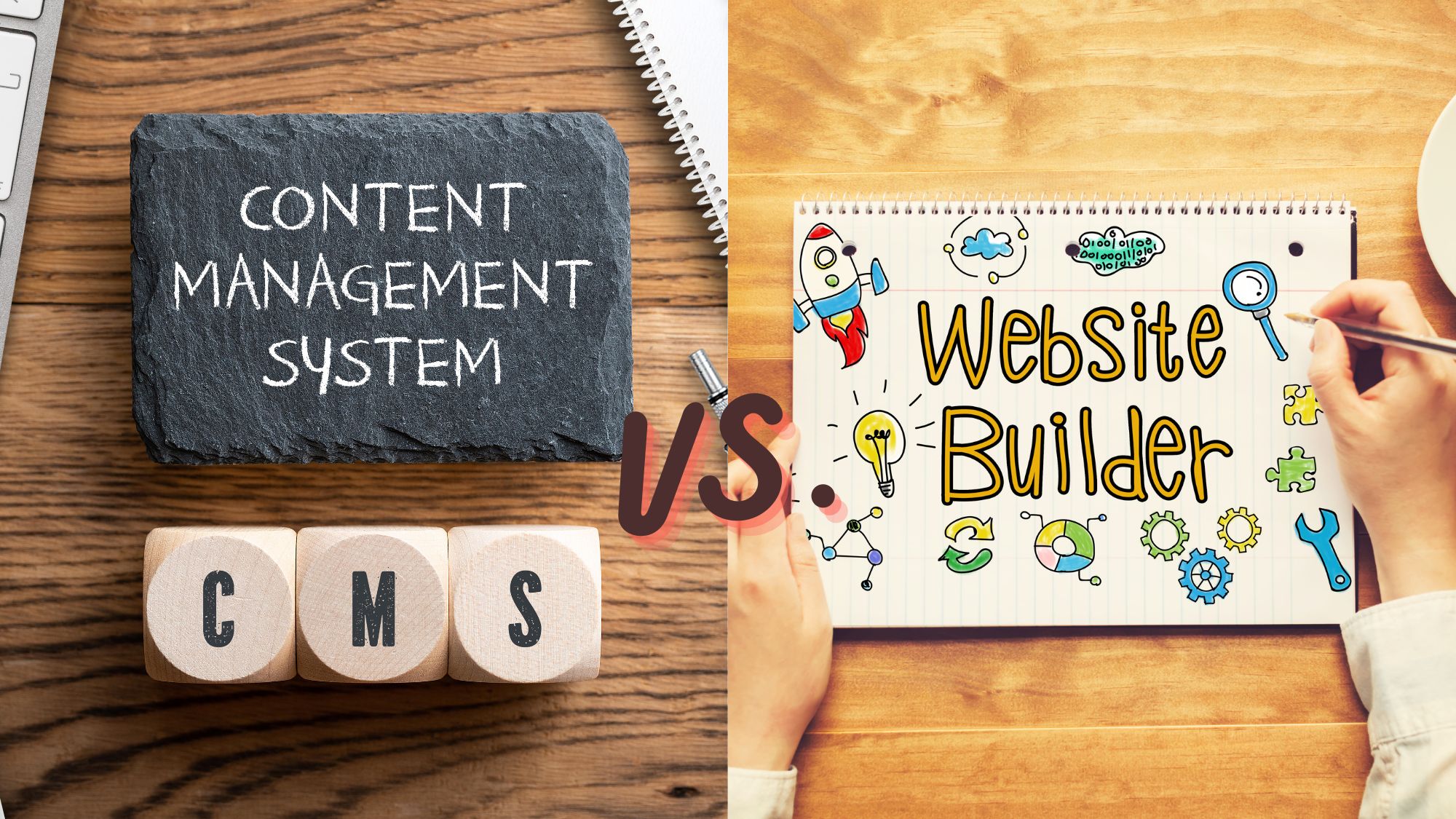CMS vs website builder
Let’s clear up what these are and what sets them apart

Thinking about creating your website from scratch but aren’t sure what tools to use? Well, there are two main paths you can take: using an all-purpose content management system (CMS) or utilizing a beginner-friendly website builder.
In either case, you’ll get a terrific site-building solution that has made this otherwise time-consuming and tiresome task easier than it had ever been before. However, it should be noted that these tools typically ask for a whole different level of technical how-how.
As a rule, less experienced users are more attracted to site builders as they utilize intuitive, simple-to-use user interface (UI), drag-and-drop functionality, and tons of appealing ready-made templates.
On the other hand, tech-savvy users with coding skills won’t be scared by the complexity and overall capacity of a CMS as it offers them the freedom and flexibility to shape their site to their heart's content.
So, on the surface level, a CMS and a site builder differ in terms of complexity, but it goes beyond that.
To help you decide which one is the right solution for you and your online project, we’ll clear up what these pieces of software are, what are their main pros and cons, and what separates them from each other.
What is a CMS?
A content management system (or CMS for short) is software that can help you create a fully functional site without the need to write all the code from scratch - it can be a lifesaver if you have no coding skills at all. As the name suggests, its primary purpose is to manage content in a database - create it, delete it, store it, modify it, publish it, and so on.
Sign up to the TechRadar Pro newsletter to get all the top news, opinion, features and guidance your business needs to succeed!
Currently, the most popular CMS on the planet is WordPress as it powers over 43% of all the sites on the web. However, there are many more CMS’ on the market and some of them are more suitable for specific sites (like ecommerce stores) than WordPress - such as Prestashop, Magento, and BigCommerce.
Some of the advantages of utilizing a CMS include user-friendliness, simplified site maintenance, cost-effectiveness, extendable functionality (via plug-ins, for example), and community support.
However, there are some drawbacks as well. Namely, the time-consuming aspect of the maintenance, hidden costs, and reliance on plug-ins, extensions, and widgets. Also, while a CMS can give you complete control over every element of your site it also places a lot of responsibility on your shoulders - particularly when it comes to security.

What is a website builder?
As its name implies, a website builder is a software (whether a stand-alone program or part of a platform) that’ll enable you to put together a site. Plus, you’ll be able to do it in no time.
Thanks to tons of ready-made themes, templates, and layouts, pretty much anyone can create an attractive site without any designer or developer skills - or without hiring a designer or a developer when we’re at it.
Being the most beginner-friendly site-building tool out there, a site builder will supply you with a simple-to-use editor that will let you customize elements on your site’s pages. For instance, Wix offers over 800 designer-made templates and all of them are customizable, which means your site should stand out in the crowd - if you have a stab at the editor, that is.
While a site builder can be a superb time-saver, it comes with some strings attached. First and foremost, your site will never be truly yours, which makes a transition to other platforms somewhat tricky. Also, since you don’t have full ownership of your site, if you forget to renew your subscription before it expires, you’re risking losing your site and its content.
With ongoing costs and add-ons (like for marketing, SEO, or advanced analytics) you’ll have to purchase separately, the total cost can spike up swiftly.
What’s the difference between a CMS and a website builder?
While the usability will vary from one solution to the next, most site builders are created with beginners in mind, which is not the case with CMS’. Also, a site builder functions as an all-in-one platform that streamlines the site-creation procedure but also throws in other terrific things as well.
For instance, most professional site builders include web hosting services (the likes of Weebly, Squarespace, and Shopify) while most CMS’ are self-hosted, which means you’ll have to find hosting services somewhere else.
Also, standard CMS software is pretty bare-bones at the start but it can be customized with plug-ins, extensions, and modules. In contrast, with a site builder, you usually start with more features, but they can’t be customized in such a way.
Plus, tech-savvy users who know how to write custom code can enjoy endless customization with a CMS, which is not possible with closed systems like site builders.
However, site builders are stronger in terms of standard customer support (like 24/7 live chat), while with most CMS’ you’ll have to settle for the support offered by the software’s committed community.
Last but not least, with a CMS you’ll have complete ownership over your content, which is not the case with site builders - sometimes, you won’t even get a chance to use your own domain.
Similarities between a CMS and a website builder
CMS’ and site builders share their primary objective and that is to make it possible to create, manage, and maintain a site without coding skills. In addition to being beginner-friendly, both solutions will let you customize your site’s appearance and make it stick out.
Also, with a CMS and a site builder alike you’ll get some search engine optimization (SEO) tools. However, due to its high customizability, a CMS comes stronger in this case.
As for pricing, while both CMS’ and site builders can be free, pocket-friendly, and premium, the cost of utilizing a site builder is more predictable than with a CMS.
In terms of security, a site builder is considered to be a safer option than a CMS due to its closed, proprietary nature. In contrast, the security of CMS software is as strong as you make it to be - you’ll have to take care of all security updates, backups, and site optimization.
Which is better?
Since there can’t be a straight answer to this sort of question, we can’t give you one. Some users might feel right at home with a CMS while others prefer the security, stability, and support they’ll get with a site builder.
On the other hand, CMS’ will give you more control over your site and its content, which is a top priority for some users. So, it all depends on your particular needs and preferences.
For instance, although a site builder is more secure overall if you’re willing to pour your time, effort, and energy into making your CMS site more secure (and utilize all the right plug-ins), it can be equal in terms of security to a site created by a proprietary builder.
Also, while a run-of-the-mill site builder will supply you with some SEO tools, if you pair your CMS with the right plug-ins you can optimize your site’s performance to perfection. However, even if you’re using a free, open-source CMS (like WordPress), the best among its plug-ins won’t come free of charge.
So, even if a CMS site might be a cheaper choice in the early stages, once you start piling up paid plug-ins you might be caught off guard by the total cost.

Should I use a CMS or a website builder?
If you possess development and designer skills (or at least a desire to learn) and want complete control over the direction of your site - then a CMS is a clear choice for you.
However, if you’re a total beginner and don’t have enough time to invest in developing new skills - a site builder might be a better choice for you.
We should also note that once you choose one of these solutions it’s best to stick to it since switching between these after you’ve built your site is immensely impractical.
Final thought
Now, you should have a clearer idea of which of these site-building solutions is the right choice for you.
Since most of these tools offer either a free tier or a free trial, it’s a smart strategy to try them out for yourself before reaching a definitive decision.
Also, once you opt for one specific solution take some time to do a background check about the company behind it and run through a few hands-on reviews. Only then you can be sure you’ve made the right choice.
- Here are the best web hosting services on the market
Mirza Bahic is a freelance tech journalist and blogger from Sarajevo, Bosnia and Herzegovina. For the past four years, Mirza has been ghostwriting for a number of tech start-ups from various industries, including cloud, retail and B2B technology.